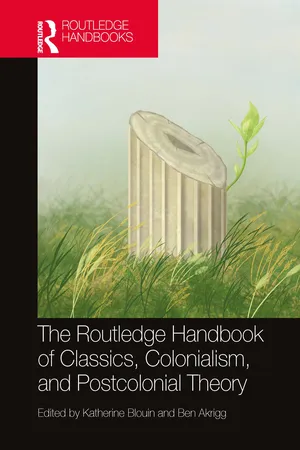
The Routledge Handbook of Classics, Colonialism, and Postcolonial Theory
- 700 pages
- English
- ePUB (mobile friendly)
- Only available on web
The Routledge Handbook of Classics, Colonialism, and Postcolonial Theory
About This Book
This handbook explores the ways in which histories of colonialism and postcolonial thought and theory cast light on our understanding of the ancient Mediterranean world and the discipline of Classics, utilizing a wide body of case studies and providing avenues for future research and discussion.
It brings together chapters by a wide, international, and intersectional range of scholars coming from a variety of backgrounds and sub-disciplinary perspectives, and from across the chronological and geographical scope of Classics. Chapters cover the state of current research into ancient Mediterranean and South, Central, and West Asian histories. They provide case studies to illustrate both how postcolonial thought has already illuminated our understanding of the ancient Mediterranean world and beyond, as well as its potential for the future. Chapters also provide opportunities for reflection on the current state of the discipline. An introduction by the volume editors offers a survey of the development of postcolonial theory, its relationship to other bodies of theory, and its connections to Classics. Toward the end of the book, three scholars with different career and disciplinary perspectives provide short reflections on the themes of the volume and the directions of future research.
The Routledge Handbook of Classics, Colonialism, and Postcolonial Theory offers an impressive collection of current research and thought on the subject for students and scholars in classical studies understood in its larger sense as well as in related disciplines such as Archaeology, Ancient History, Imperial History and the History of Colonialism, Reception Studies, and Museum Studies. For anyone interested in classical antiquity, it provides an engaging introduction to a potentially bewildering, but ultimately vital and enriching, body of thought and theory.
Frequently asked questions
Information
Table of contents
- Cover
- Half Title
- Series Page
- Title Page
- Copyright Page
- Dedication
- Table of Contents
- List of Figures
- List of Map
- List of Contributors
- Acknowledgments
- 1 Introduction
- 2 Edward Said’s Orientalism: a reappraisal
- 3 Classics at the borderlands: decolonising with Gloria Anzaldúa
- 4 Classics between epistemicides and hauntologies: a Caribbean reading
- 5 Placefulness and classical topoi in the writing of Ishion Hutchinson
- 6 Indigenous writers of North America and Greco-Roman antiquity: postcolonialism without the post?
- 7 The ancient past in the historical present: postcolonial theory and ancient Indian history
- 8 Subalternity in the Roman metropole
- 9 Rape and race: intersectional perspectives on Aeschylus’ Suppliants, with a coda on Charles Mee’s Big Love
- 10 Resistant receptions: a postcolonial approach to receptions of Greek tragedy
- 11 “Two-Eyed Seeing” and teaching classical literature
- 12 Postcolonial feminisms and colonial encounters in the Hellenistic period
- 13 Periplus, periplum, periphery: how to map classics from the edges
- 14 Time and the other Greeks
- 15 Our terms and theirs: some reflections on recent approaches to Greek religion
- 16 (Post-)colonialism and ancient magic
- 17 Haec de Africa. Rome’s imagined Africa and the limits of fiction
- 18 A colonialist trick of the eye: Valerius Maximus’ Memorable Deeds and Sayings as a tool of imperial education
- 19 “They look white, but they’re not”: nationality, race, and classical tradition in Brazil
- 20 Res Diversissimas: a postcolonial reading of Hannibal’s reception
- 21 “Perhaps it matters little to what race Terence belonged”: historicizing the life of Publius Terentius Afer
- 22 Alexander the Great studies and Hellenism in Uzbekistan: a postcolonial and decolonial discourse within a Central Asian archaeology stalled between post-Soviet myths, centre-periphery tensions, and non-recognition of Russian colonialism
- 23 Locating Indo-Iranian borderlands between Central Asia and South Asia: a reading of the past connected history (third century BCE to sixth century CE)
- 24 “Ê Faraó!”: the reception of ancient Egypt in Brazilian carnival
- 25 The long, winding, and bumpy road: seeing museum antiquities as colonial legacies
- 26 Thucydides on colonialism and hegemonic discourse
- 27 Forgery as decolonisation: Constantine Simonides in Liverpool
- 28 Those who tell their stories never die: on being an ‘Indigenous’ Egyptian researcher in the current increasing ‘local’ inclusion turn
- 29 Troubled archive: (de)coloniality and Egypt’s papyri
- 30 The materiality of papyri and the decolonization of Papyrology
- 31 “Many strange and impossible views”: the curious career of Frederic Cope Whitehouse (1842–1911)
- 32 Teaching classics in South Africa—a hopeful act: reflections on a decolonising teaching experience
- 33 Colonizing the past: the case of Argos in the late eighteenth and early nineteenth centuries
- 34 Examinations at the founding of the University of Toronto: the place of classics in the institutionalisation of Canadian education
- 35 “The ancient Romans conquered all Syria and Egypt”: encounters between Arabic and the Classics in the nineteenth century
- 36 Claiming authority: the Antiquities Act and the legacy of classical archaeology in America
- 37 Where Next?
- 38 Where Next? 2: reflections on my struggle with theory
- 39 Where Next? 3
- Index